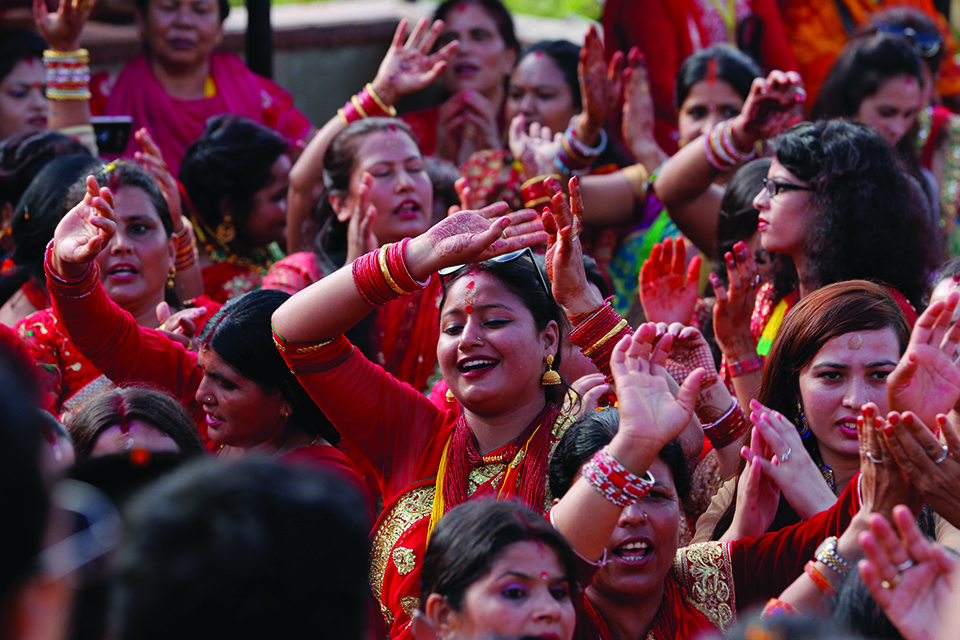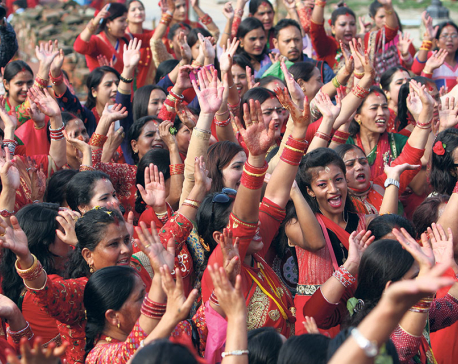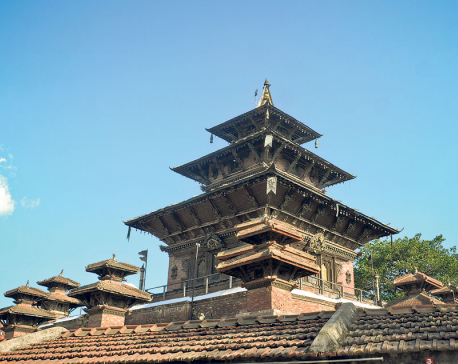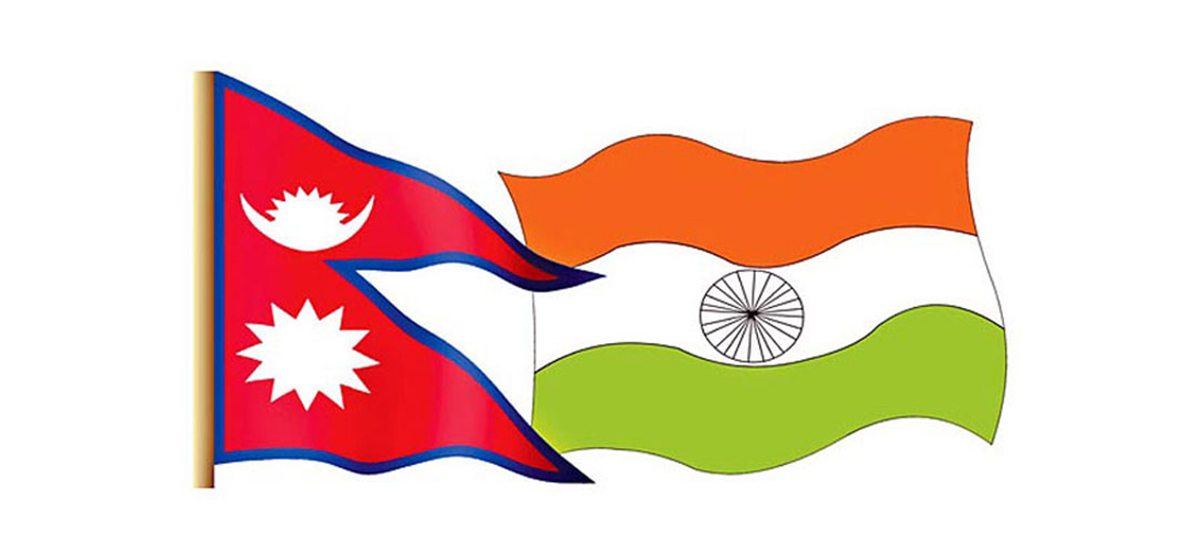
OR


Sabita Nakarmi
(The author is a section officer at the Ministry of Foreign Affairs, Nepal)news@myrepublica.com
Government and all of us need to work together to fight the prevailing criminality and impunity if we want a happy and prosperous family, the wish we make in Teej
Two kinds of sound keep reverberating in my ears these days: The music that women rejoice for celebration of Teej and the rampant cases of rape of children and women. Both are the (mal)practices established by patriarchal social structure. While the former can at least be considered as cause of sisterhood and fasting from health perspective, the latter calls for a strict criminal law enforcement and severe punishment system to the predators.
Teej, also called ‘Haritalika’ is a three-day festival that Hindu women, particularly Brahmins and Chhetris, observe throughout the country with full zeal and enthusiasm, on the third day of the lunar month of Bhadra (late August/early September). Women fast for the prosperous life of their spouse and family. Married women put on bangles, ‘pote’ (a necklace made of glass beads), ‘Tilahari’ and ‘Sindur’ (vermillion powder) as the symbols of marriage and dress themselves up in beautiful red attire along with ornaments.
A day prior to Teej, women enjoy various delicious dishes known as ‘dar’ and strictly fast the next day of Teej. The festival ends with Rishi Panchami, a festival of soul purification.
Bad and good
The only good thing I find about Teej is that it is a celebration of sisterhood as sisters gather at natal home and indulge in jubilant dancing and singing. This practice of sisterhood is intact only in villages where women are busy with their chores and usually cannot go to their mother’s home. On the day of Teej, they forget their nagging mother-in-laws, demanding husbands, children and daily chores and spend it for themselves. Taking care of one’s body and time is somehow self-empowering.
But in urban area, ‘dar’ has become fashion for some women to show off their accessories and jewelries. Teej is taken as an opportunity for extravaganza by organizing feasts weeks before the arrival of real Teej which has nothing to do with wealth and property. In fact, Teej should be celebrated in a simple manner incorporating all strata of people enhancing goodwill among them.
Second, dar promotes unhealthy eating. Women indulge in binge eating for an entire day and then they starve themselves the next day. How on earth bingeing and starving become healthy food habits? Every year, we hear the news of a number of women suffering from diarrhea, dehydration and fainting during Teej.
Third and most importantly, Teej promotes the age-old tradition of male domination. Can a woman’s fasting ensure long life for her spouse? What about the countries where Teej does not exist and life expectancy of people is more than that of Nepali men? And, don’t the men also need to fast for the longevity of their wives if fasting ensures happy conjugal life?
Blindly following the spiritual legend of goddess Parbati who observed maiden fast and got Lord Shiva as her spouse, and then really fasting without drinking a drop of water is merely being foolishly superstitious. Instead, the focus should be on promoting education and raising awareness about healthy food habit and healthy fasting. Women need to be educated, aware and self-decisive to know about what is good and bad, right and wrong for them.
Finally, Rishi Panchami is observed on the third day of Teej by following ritual of bathing, worshipping and chanting prayers to purify body and soul from menstrual sins. Our culture believes menstruation is a sin. Touching the statues of gods and goddesses and entering temples during menstruation is considered as a sin. I wonder when people will be fully cognizant of the fact that menstruation is just a process in a woman of discharging blood and other material from the lining of the uterus at intervals of about one lunar month from puberty until the menopause, except during pregnancy.
There is nothing sinful about menstruation. It is just a natural physical process.
This tendency of treating women’s body as sinful needs to be checked soon. In short, Teej should not be a bundle of malpractices. It should be an opportunity for empowerment and healthy lifestyle.
Rising rape
I find it more perturbing that Teej fever is in the air amid several breaking news of innocent young girls being victimized by horrendous rapes. It is disheartening to read the news of rapes of women and girls almost every day. Almost three rape cases are reported every week whereas many more cases possibly go unreported. It was not even a week that we read about the rape and murder of 13 year old Nirmala, when we heard of another case of gang rape of another younger girl. How can men be so viciously cruel and insensitive, even not to spare innocent under-aged girls? How scary is it to learn that women and girls are not safe at home, nor at school nor anywhere in street, public transport and the workplace, in the country where Lord Buddha, symbol of world peace, was born?
Although our constitution guarantees protection of women’s right, the practical life is totally different. Men cannot be trusted as guardians, relatives or neighbors here. The ambience of inhumanity looms over the fate of girls.
Actually rape is not only a sexual crime. It is a projection of violence and power deeply-rooted in patriarchy. Mostly the perpetrators are from powerful families who go unpunished as the poor victims of rape usually keep the incident secret for the reasons of prestige, honor, fear, future and lack of protection. Even when the culprits get apprehended, they do not get severe punishment and most of them are forced into a settlement. Justice is always denied to the victims since the concerned authorities fail to act responsibly.
Urgent action
It is urgently necessary to take action against such serious crimes on women and girls. The strict law enforcement for the culprits through investigation and action is a must. While the perpetrators should not go unpunished, the victims should not be left unprotected.
The government must ensure that victims get justice along with protection instead of the fear of social stigmatization. Women should be self-defensive and empowered physically and mentally through education and awareness, and society must protect women and girls. On this, men must support women in the efforts to punish the criminals who relentlessly abuse the innocent women and girls. They should realize that one day such heinous crime might befall their own daughters and sisters.
Government and all of us need to work together to fight the prevailing criminality and impunity if we really wish for a happy and prosperous family and society, the wish we make in Teej. Only when the law and order, rules and security are ensured, the purpose of healthy Teej of longevity and prosperity of spouse, family and children will be materialized.
So, let’s make this Teej a moment of empowerment with firm commitment to fight against injustice and impunity while leading a healthy lifestyle.
The author is a Section Officer at Ministry of Foreign Affairs, Nepal
You May Like This

(IN PICS) Teej festival being observed across the country
KATHMANDU, Sept 12: The 'Teej' festival, also celebrated as the 'Haritalika', is being observed by Nepali Hindu women today throughout... Read More...

Rights groups express concern over impunity for acts of torture in Nepal
KATHMANDU, June 26: Various human rights groups have expressed concern over the failure of the authorities to investigate and prosecute acts of... Read More...

The legend of power play
Dashain is celebrated for fifteen days. The Hindus revere goddess Durga and her nine different manifestations during the festival. In... Read More...





Just In
- 120 snow leopards found in Dolpa, survey result reveals
- India funds a school building construction in Darchula
- Exploring opportunities and Challenges of Increasing Online Transactions in Nepal
- Lack of investment-friendly laws raises concerns as Investment Summit approaches
- 550,000 people acquire work permits till April of current fiscal year
- Fixing a win by outlawing dissent damages democracy
- MoHP cautions docs working in govt hospitals not to work in private ones
- Over 400,000 tourists visited Mustang by road last year










_20220508065243.jpg)

Leave A Comment